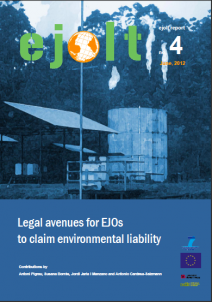
From oil drilling disasters at the equator to climate change effects on the North Pole and from uranium mining in the desert to the dumping of toxic waste on the streets of a big African city. Environmental injustices happen in all stages of various resource lifecycles. They travel the world, but not at random. Most often, they are guided in that journey by multinational corporations, who usually make sure that they only visit the peripheral area’s of our global economy. While they try to hide their injustices, we don’t stop with exposing them. But this report – EJOLT report 4 – goes further: it also provides the tools to fight, in order to redress the injustice. This report reads like a large manual for environmental justice organizations that want to take their battle –wherever it is – to court.
Using 11 case studies, the EJOLT report ‘legal avenues for EJOs to claim environmental liability’ examines the scope for different courses of legal action against environmental injustice, wherever it takes place: from the national to the international. The thread common to all cases is that severe environmental damage to the environment is often associated with the involvement of large multinational companies – who often try to operate in a self-created legal vacuum. As the report shows, legal frameworks exist, at different levels, and are applied, with varying degrees of success.
The report concludes that transnational cluster-litigation is the most efficient strategy to tighten the meshes of judicial action upon multinational companies. But it also gives 17 clear conclusions for the many EJOs fighting for environmental justice all over the world. For example: what are the advantages and drawbacks of using the ATCA in the US? How should the role of The European Court of Human Rights, the Inter-American Court of Human Rights and the African Court of Human and Peoples’ Rights be understood? Which EU policies detail how EU companies should behave even outside the EU?
This report will not remain a one-shot effort to assist EJOs in fighting for environmental justice. Case studies will be turned into factsheets and posted on the EJOLT website, in the resource library. The authors will remain in touch with many EJOs working on specific cases. Dr. Antoni Pigrau, is currently participating as a member of the Permanent Peoples’ Tribunal (PPT) in the sessions of this institution in Mexico. And we will continue to bring both this report and several cases under the attention of the general public and relevant policy makers. If you wish to help us: please do send the report to anyone you think might make use of it. Or contact us for any questions. Join us in the struggle for environmental justice!

The project ENVJUSTICE has received funding from the European Research Council (ERC) under the European Union’s Horizon 2020 research and innovation programme (grant agreement No. 695446)